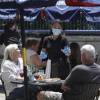While the CDC's Thursday announcement that vaccinated people can reduce their mask-wearing was a relief to many who are eager to show their smiles in public again, it's not yet the rule everywhere, and there's likely to be some confusion as Massachusetts transitions to a new normal.
For Bob Luz of the Massachusetts Restaurant Association, the CDC announcement was welcome news.
"It's very exciting news, because it means we're one step closer to having all restrictions removed on restaurants, bars, nightclubs — which still aren't open — hotels, and really the broader tourism industry," he told GBH News.
But right now, Luz pointed out, nothing has really changed in Massachusetts.
"So the governor's orders are still in play and the governor's orders are just like they were two days ago," Luz said, explaining that restaurant patrons are still required to wear masks in restaurant settings, unless they're eating or drinking.
But Gov. Charlie Baker signaled Friday that a change could be coming soon.
"The new @CDCgov guidance is great news," Baker tweeted. "We will be updating our reopening plans early next week. Massachusetts is on track to vaccinate more than 4 million residents soon. Please stay safe while we prepare next steps to return to our new normal."
Luz said he hopes that update includes a lifting of the indoor mask mandate and a new timeline for fully reopening the state.
"And I'm hoping it's well before August 1st," Luz said, noting that Massachusetts has one of the latest plans in the country for a full reopening.
Jon Hurst of the Retailers Association of Massachusetts echoed that sentiment.
"Probably as we're leading the country in vaccinations, we should reconsider whether we really want to be bringing up the tail end on reopenings," Hurst said. He also welcomed the CDC announcement this week.
Even if the governor lifts the mask mandate, the change inside stores won't happen immediately everywhere, Hurst said.
"I think you're going to see a transition," he said. "Some will still have a posting asking for a mask, others will say — assuming the governor does change the state policy — that 'We're following the state guidelines and we're asking non-vaccinated to wear masks.'"
But that creates its own challenges, he said. "No small business wants to be in the role of acting as as police officers and having to enforce that. Whether it's looking at a vaccination card or a passport or anything like that, that puts you just at an unacceptable position with your customers." So he suspects any new guidelines will operate under an honor system.
What businesses really need, Hurst said, is some uniformity in the rules.
"All this dribbling out of a lot of messaging gets confusing to the consumer and to the small business owner," he said. "One day there's new messaging out of Washington, D.C. Another day there's there's new messaging out of Beacon Hill. And the next day out of city hall. I do think that we need to get a little bit more on the same page and and try to coordinate."
Even a change in the state's rules may not provide that uniformity, since cities and towns have some flexibility to be more stringent, if they choose to be.
"Typically, the local boards of health do follow the state mandates, and we really have to if they're a governor's order," said Marcia Testa, President of the Massachusetts Association of Health Boards, and a professor at the Harvard T.H. Chan School of Public Health. "You can make the order more restrictive and a little bit more forceful, but you can't really go in the other direction."
And, Testa, said, local boards of health will carefully consider what to do, and some will still require masks in certain circumstances.
"With 351 towns [in Massachusetts], the probability is, yes, there will be some that will go in that direction, and there might be a particular reason for it," she said. "The reason might be is that they have higher rates than other places do, and they consider this a precaution."
So even if Baker rolls back his mask guidance next week, with each restaurant, business, city and town able to set their own rules, people will likely still have to at least carry a mask in their pocket, just in case someone asks them to put it on.








